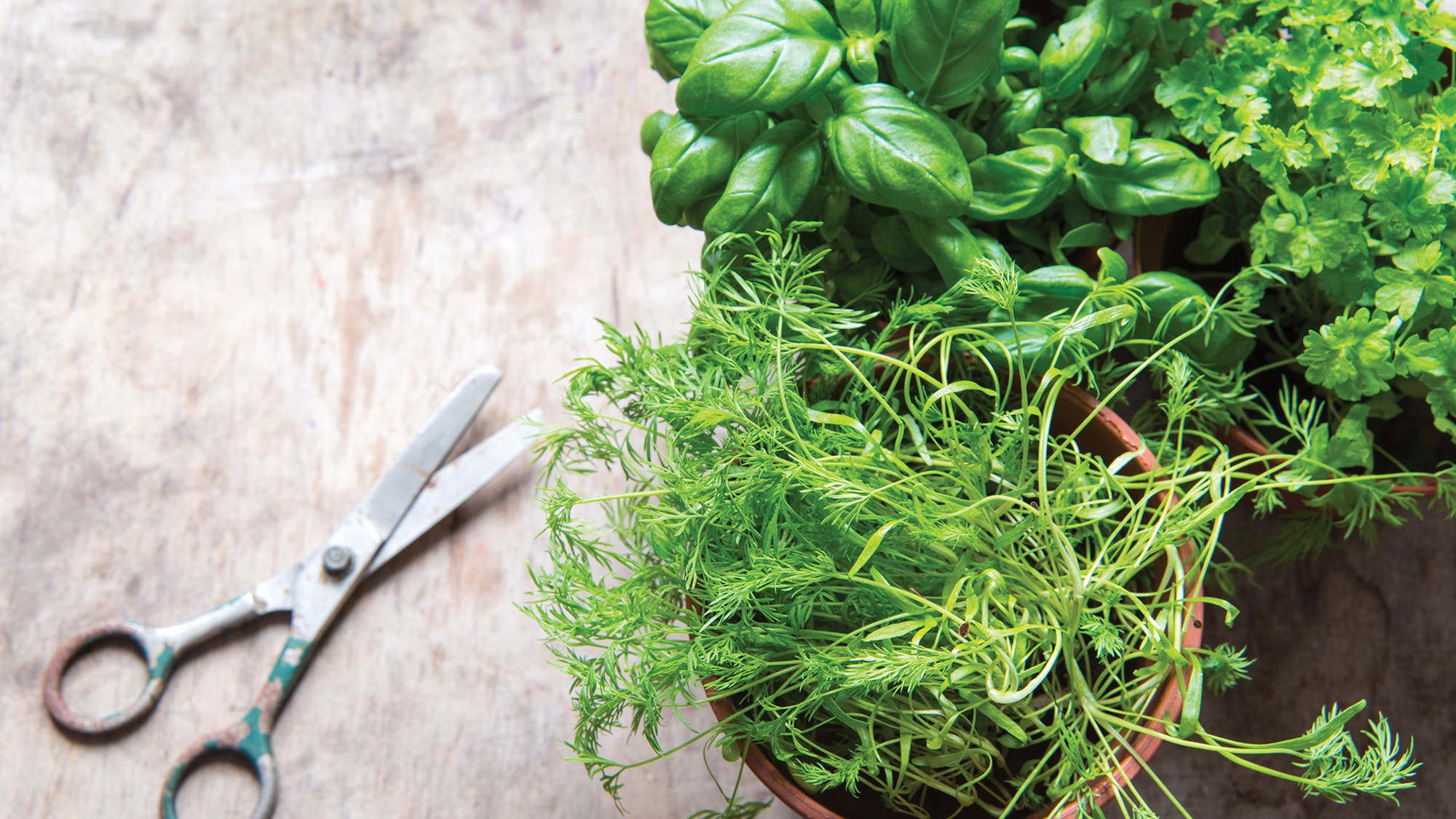10 Ways Eating Green Can Keep You Lean


1. Shifting your plate to more plants and less meat is the single biggest step you can take to a diet that’s both leaner and greener.
Globally, about 70% of all agricultural land and 8% of global water is used to grow crops for livestock, making meat the most energy-intensive part of your plate. So much so that a study in Environmental Science & Technology found that going without meat and dairy less than one day a week can slash your food-related climate footprint more than buying all locally sourced food. Bonus: A diet brimming with a variety of plant foods with smaller portions of animal products is associated with lower body weight, less chronic disease and greater longevity.
See alsoWhy You Should Eat More Plants.
2. You’ll eat closer to the source, the way nature intended.
Eating the way nature intended – by choosing real, whole foods that are minimally processed – does more than just deliver a satisfying nutritional bounty (think vitamins, minerals, fiber, phytochemicals and more) in a way that’s designed for your body’s biology. Minimizing highly processed packaged foods and beverages also helps you sidestep questionable ingredients. And you’ll also minimize additional, energy-intensive processing and packaging involved in creating many of those “inner aisle of the supermarket” products.
See also What Is Clean Eating?
3. You’ll savor delicious bean dishes from all over the world.
Choosing clean proteins is a cornerstone of the Clean Eating philosophy, and beans are one of the cleanest, leanest, greenest superfoods on the planet. In fact, legumes are such a powerful food for personal and planetary health that the Food and Agriculture Organization of the United Nations (FAO) has declared 2016 the International Year of Pulses, as they provide a bevy of impressive nutrition benefits (including protein, fiber, folate, potassium, magnesium and iron) in a low-calorie package. Pulses are also one of the most sustainable protein sources, as they have unique nitrogen-fixing properties, which can help increase soil fertility and improve the health of the planet.
4. Preparing and serving the right portion size trims your waistline and your waste.
In today’s supersized-food environment, quantity is as important as quality. And learning to enjoy the right-sized portions of foods is an essential life skill for staying lean. It can also be a powerful tool to reduce food waste: In the US, approximately 20 pounds of food per American is wasted each month. Not only does all of that discarded food require energy and resources to produce, but when it goes to the landfill, bacteria break it down and release methane, a greenhouse gas that is 25 times more potent, pound for pound, than carbon dioxide.
Eat clean and get lean with our dietitians, Erin Macdonald and Tiffani Bachus. Their new Clean Eating Academy course, A Whole-Life Guide to Lasting Weight Loss, can help you meet your goals.
5. You’ll get to savor high-quality, healthier (ancient) grains over the highly processed modern counterparts linked to weight gain and inflammation.
Intact whole ancient grains and seeds (such as quinoa, buckwheat, farro and barley) are some of nature’s most nutrient-dense, eco-friendly plant-based staples. Complex carbohydrates found in whole ancient grains are absorbed more slowly into the body than refined carbohydrates, helping to maintain stable blood sugar levels. They also provide an important source of fiber, B vitamins, trace minerals like selenium and zinc, and prebiotic fibers that enhance digestive health. Research from Wake Forest University Health Sciences has found that eating 2½ or more servings of whole grains each day can slash heart disease risk by 21%.
6. You’ll reinvigorate your relationship with tap water – your healthiest and greenest water option.
Water comprises up to 60% of your body weight, so whether your goal is to flush waste from your system, keep your metabolism primed or help skin stay supple, drinking plenty of water is an essential part of your health journey. Consider that the production of a typical bottle of water, for instance, requires about 2 to 3 times as much water to produce than is found in the final product. So fill up your favorite glass, Mason jar or BPA-free reusable water bottle with freshly filtered water throughout the day and keep it where you can see it and sip it. CE recommends consuming 2 liters of water per day.
See also Reconsider Tap Water: The Healthiest Water Options.
7. Enjoying plenty of raw, fresh foods helps fill you up on fewer calories and uses less power.
Eating plenty of fresh or raw foods not only helps fight fatigue and sluggishness, but they require little to no additional energy to prepare, helping reduce your power usage. Aim to enjoy several servings of raw, no-cook foods each day, including a variety of vegetables (especially dark leafy greens), fruits, nuts, seeds and sprouted grains. These foods are a rich source of fiber, essential minerals such as iron, magnesium and zinc, as well as detoxifying enzymes and cancer-fighting phytochemicals. In fact, in a 2013 study in the American Journal of Epidemiology, European researchers found that eating an abundance of raw veggies was associated with a 16% drop in mortality rate.
8. Including more organic foods in your cart can reduce your carbon footprint and may keep you leaner.
Research shows that organically managed soil acts as a massive carbon sink and regenerates soil richness. According to the Rodale Institute, if all conventionally farmed cropland were switched to organic agriculture practices, we could prevent more than 40% of annual carbon emissions. What’s the lean benefit? While more research needs to be done, there’s some evidence that chronic, low-dose exposure to antibiotics through livestock may be disrupting the normal, steady state of the gut microbiome, contributing to the surge in obesity. (According to the latest report from the US Food and Drug Administration, approximately 74% of all medically important antibiotics sold in the US are used for livestock feed, in part to promote growth.)
9. Eating “root to tip” enhances nutrition and reduces food waste.
Using every nutrient-rich part of the plant – from fiber-packed sweet potato skins to iron-rich beet greens – helps pack even more vital nutrients into your diet and reduces food waste in one delicious bite. According to the Environmental Protection Agency, food waste is the second-largest component of trash in the US, accounting for 18% of the waste stream.
Use the whole vegetable! See Kate’s recipe for Quick Carrot Top Pesto.
10. Cooking at home helps you stay lean and green all week.
While a salad ordered from a restaurant still fares better than a grilled steak at home in terms of environmental impact, when comparing similar foods, home is the greener choice. That’s due to the refrigeration, heating, cooling, lighting and water that retailers need to keep customers coming back. Dining out is associated with higher body fat, obesity and a higher intake of calories and sodium. Yet today, roughly half of every dollar spent on food in America goes to meals prepared outside the home. Bring your kitchen to life by preparing your own meals and snacks as often as you can.
See also Meal Plans + Grocery Lists
Kate Geagan, MS, RD, is an award-winning dietitian and internationally recognized leader in sustainable eating and nutrition. She is the author of Go Green, Get Lean: Trim Your Waistline with the Ultimate Low Carbon Footprint Diet and she’s regularly appeared on The Dr. Oz Show and Katie Couric’s show Katie.